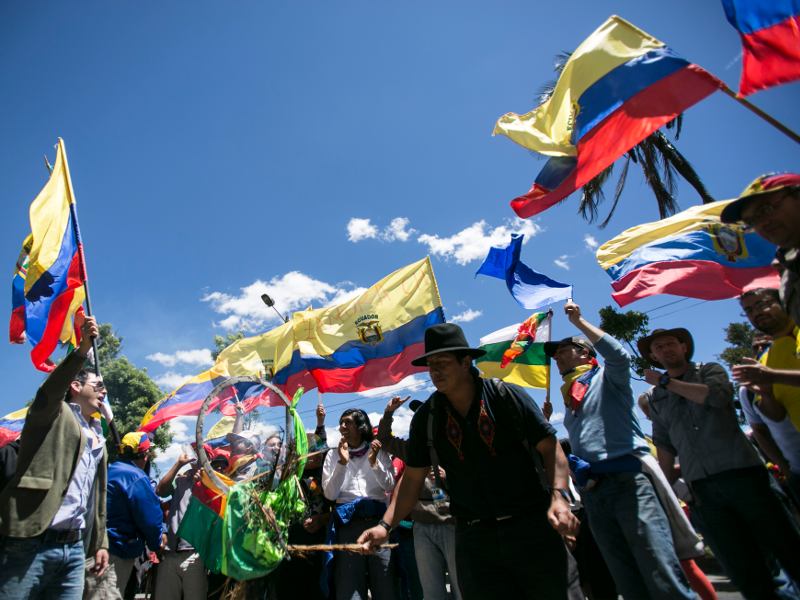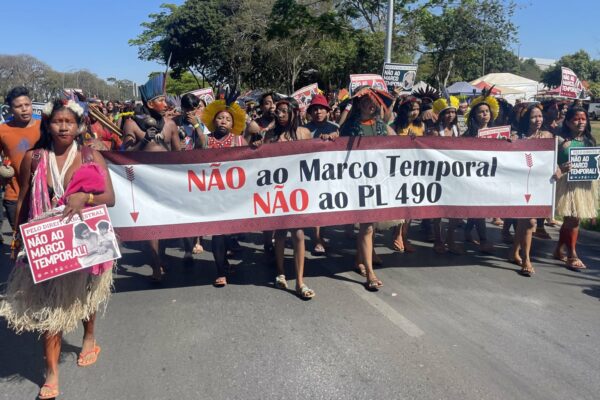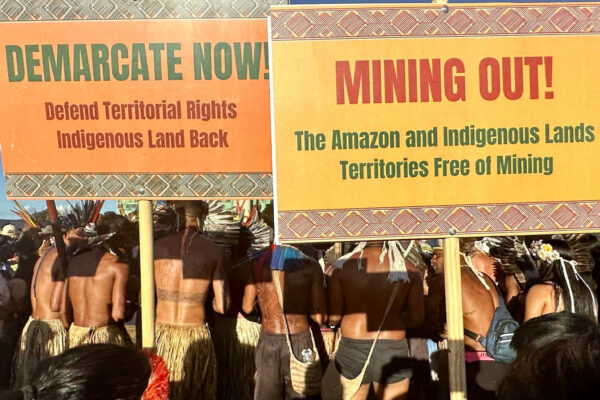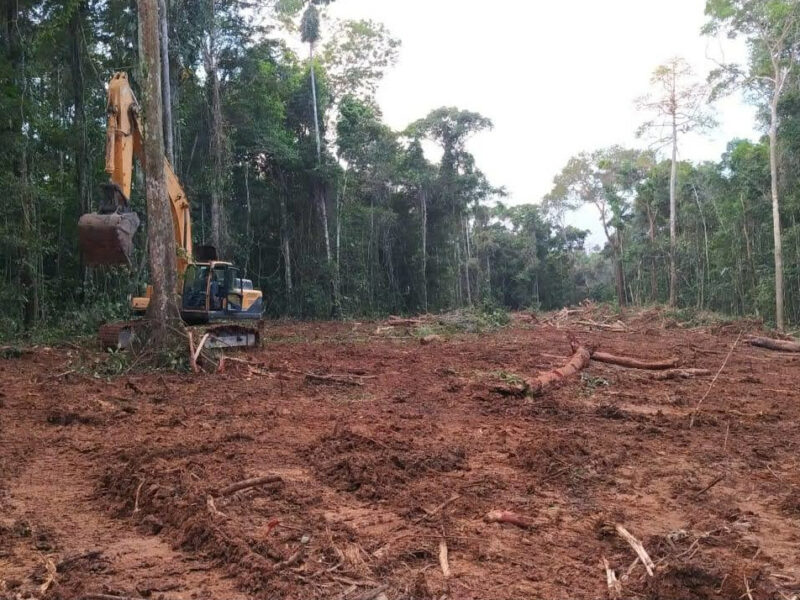
All over the capital city of Quito and throughout the small towns in the countryside, campaign propaganda is everywhere. Posters choke telephone poles, flags hang from windows, awnings, and corner stores, entire houses are painted with the respective colors of Alianza PAIS – Ecuador’s governing party of the last ten years – and those of the opposition CREO party, which is running on the promise of change. This Sunday, Ecuadorians will take to the polls and vote again for president, and the stakes couldn’t be higher for the country’s Amazon rainforest and its indigenous inhabitants.
The April 2nd run-off election pits Guillermo Lasso, a right-wing former banker against the former vice president of the outgoing and controversial current president, Rafael Correa. It will be the first time in recent memory that Correa, the country’s longest-standing elected president, won’t be on the ballot. The Alianza PAIS ticket is led by both vice presidents who served under Correa: Lenin Moreno and Jorge Glas.
Ten years ago, Correa embarked on what he dubbed a “Citizens’ Revolution,” the largest expansion of public sector spending in the country’s history, which included investments in schools, hospitals, roads and other infrastructure development like port expansions and hydroelectric dams. The administration also greatly expanded subsidy programs for housing and monthly cash payments to the country’s poor.
But it has all come at a price. To implement these popular measures, and to maintain the national economy after being shut out of the finance world due to a debt default, Correa borrowed heavily from China, amassing loans for more than US $15 billion. But many of these loans must be paid in oil, committing the majority of the crude the country extracts to China through 2024. As oil prices have dropped, the quantity of oil needed to repay those loans has increased, essentially guaranteeing new oil drilling in Ecuador’s pristine, indigenous rainforest territories in the Amazon.
In other words, Correa made poverty reduction depend upon the exploitation of natural resources in one of the most ecologically and culturally important places on the planet. Correa once promised to “drill every drop of oil” in the Amazon, ignoring the ecological and cultural harm this would cause as well as the “resource curse” and likelihood of corruption (which has occurred in Ecuador) resulting from relying heavily on oil, gas, or mineral extraction as the mainstay of a country’s economy.
For his part, opposition leader Guillermo Lasso, a former banker from the port city of Guayaquil, promises a return to U.S.-aligned, right-wing policies and reliance upon traditional lending institutions like the IMF and World Bank. However, these very same institutions deserve much of the blame for the country’s historic natural resource dependence and austerity policies favoring export-led development and “free trade,” and these policies provoked a full-fledged banking collapse that forced the country to dollarize its economy in 2000. The backlash against these neoliberal policies by civil society and the indigenous movement led to the ousting of several presidents and a period of great political instability that set the stage for the ascendancy of Correa and his self-described “revolutionary” agenda.
Despite this history, in this campaign Lasso has endorsed the platform of CONFENAIE, the indigenous Amazonian confederation, which calls for an end to new oil and mining concessions, an amnesty for indigenous leaders currently facing charges of terrorism for leading anti-government protests, respect for the right to Free, Prior, Informed Consent (FPIC), and several other legal reforms affecting indigenous rights. This endorsement came after direct pressure on all the candidates from CONFENAIE and Yasunidos, an active environmental coalition that made a series of viral videos pressuring them to take strong stances on environmental protection and indigenous rights, especially in Yasuní National Park in the Amazon.
How he would implement such policies while also fulfilling his neoliberal campaign promises is an open question. If Ecuador elects him, it risks a return to past policies that were historically hostile to indigenous rights, including a likely re-opening to multinational companies that have run roughshod over the environment and human rights, as exemplified by the notorious Chevron-Texaco case.
Moreno, for the most part, has been largely silent on these issues, and so Ecuadorians and observers are left to expect a continuation of Correa’s extractivist policies.
In the first round, most Amazonian provinces chose Lasso, in a clear rejection of Correa’s efforts to expand oil and mining projects on indigenous lands, his crackdown on indigenous rights that has seen several leaders jailed and persecuted, and a state of emergency that lasted 60 days in the ongoing conflict between the Shuar, the government, and the Chinese mining conglomerate Explorcobres.
Nationally, the polls for the run-off election currently show a statistical dead heat, with Moreno at 52.4% and Lasso at 47.6%, with a margin of error of 3.4% and roughly 16% of voters undecided. Moreno’s lead is surprising, given that first-round voting split the conservative vote among several candidates who were predicted to coalesce around Lasso for the run-off. Each side has accused the other of dirty tricks: Lasso has accused the governing party of using state-run media and coffers to support its campaign, and Alianza PAIS has promoted allegations made public last week that Lasso has suspicious investments in several offshore businesses and properties. Each side has warned of possible fraud and both predict widespread protests after Sunday’s vote.
Regardless of who wins, the response to the escalated social conflicts over extractive industry projects, rollback of indigenous rights, and criminalization of civil society protest will be an early and pressing challenge for the incoming administration. Further oil and mineral development will only make the country’s economy more vulnerable to fluctuations in the world oil market, whose recent crash has Ecuador reeling. This, combined with the country’s extreme wealth disparity, means that further income from oil alone will not solve the problems of poverty in Ecuador. The country must create a diverse economy that addresses wealth inequality in order to reduce poverty.
How the new president responds will serve as an indicator of whether Ecuador can transition to a post-petroleum economy, save what remains of its pristine rainforests, and respect the rights of its indigenous inhabitants, or whether it will continue to see the Amazon and the indigenous peoples there as solely a source of short-term financial gain.
As Domingo Peas, an Achuar leader, told me today, “No matter who wins, our agenda is the same: a platform based on indigenous rights, territorial protection and defense, and solutions that maintain our forests intact, keep the oil in the ground, and show the world how frontline indigenous peoples have been protecting the sacred for millennia.”
The future of Ecuador’s Amazon – one of the most ecologically and culturally important places on the planet – hangs in the balance.













